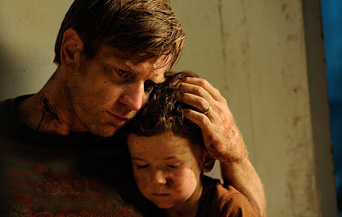The 400-Word Review: The Impossible
By Sean Collier
January 4, 2013
BoxOfficeProphets.com

The five Brits — mom Maria (Naomi Watts), dad Henry (Ewan McGregor) and kids Lucas, Thomas and Simon (Tom Holland, Samuel Joslin and Oaklee Pendergast) — barely survive the storm surge, in various states of health; they’re separated, though, and the thrust of The Impossible follows their mostly-hopeless efforts to locate one another in spite of ensuing chaos, cultural barriers and injury.
The likability of Watts, McGregor and (especially) Holland makes their plight compelling and heart-wrenching; it’s unlikely that any 2012 release will elicit more sobs per capita than this one. Bayona’s unflinching direction, along with masterful technical work by about a thousand capable below-the-line magicians, renders The Impossible as visually entrancing as it is emotionally taxing.
In other words, The Impossible is tremendous, in a vacuum. Superbly acted, marvelous cinema. The sort of stuff that prompts producers to clear statuette space on their various mantles. And it likely would be a film-of-the-year contender.
If it were fictional.
Of course, it is not. Our plucky, waterlogged heroes are based on a real family; they really did endure most of the hardships depicted in The Impossible, with only a few details fudged. (One of the real-life survivors noted that the color of a pivotal beach ball was the only major change; she overlooks the fact of her own nationality. The real family is Spanish.) The reality of their survival and the improbability of their reunion are remarkable, affirming and certainly dramatic.
These events are also, however, inconsequential footnotes to the true story of the tsunami: Nearly a quarter-million men, women and children did not survive, most of them poverty-level locals. That’s over 100 Katrinas, if you’re keeping score. I’m not inclined to invalidate an excellent film by exposing it to a bleeding heart, but even with blinders on, it’s difficult to be relieved at the survival of a quintet of rich people in the face of endless death. The Impossible is an excellent film; unfortunately, it’s also an example of a story that probably did not need to be told.